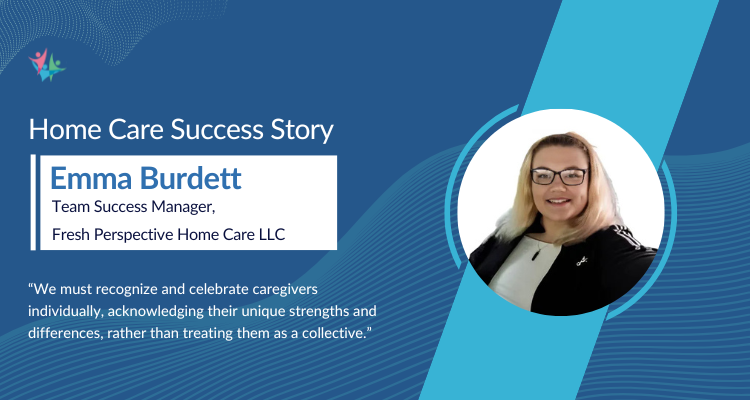Ensuring the well-being of caregivers is essential for delivering high-quality care in home care settings. When caregivers are supported both physically and emotionally, they are better able to provide compassionate, consistent, and attentive care to clients.
The demanding nature of caregiving can lead to burnout, stress, and fatigue, all of which negatively impact job performance, decreasing focus on client needs and potentially harming health outcomes.
By prioritizing caregiver well-being through initiatives like comprehensive training, mental health support, flexible schedules, and positive work environments, agencies can foster a more resilient and motivated workforce.
Healthy, motivated caregivers build stronger relationships with clients, resulting in better communication, trust, and personalized care. This approach enhances the care experience and boosts caregiver job satisfaction and retention.
When agencies prioritize caregiver well-being, they create a ripple effect of benefits—improving client outcomes, increasing caregiver engagement, and reducing turnover—leading to better overall care delivery and operational efficiency.
To shed some light on the same, we interviewed a home care industry expert to bring her perspective on caregiver well-being for better care delivery.

Who Did We Interview?
Emma Burdett is dedicated to transforming the caregiver experience through innovative recruitment, onboarding, and retention strategies. With a passion for cultivating high-performing teams, Emma expertly navigates scheduling and supervises caregiver performance, ensuring seamless operations.
Her multifaceted expertise encompasses office management, where she skillfully handles administrative tasks and record-keeping. Committed to fostering a vibrant work environment, Emma employs creative retention strategies that not only enhance caregiver satisfaction but also drive the overall success of her team.
Let us now delve into what she has to say about caregiver well-being for better care delivery:
I previously worked in scheduling for a nursing agency, starting right after COVID-19 hit. This experience opened my eyes to a different side of the industry—the urgent need for client care and the intense staffing shortages in nursing homes.
After moving back to my home state of Michigan, I sought a position that would allow me to continue growing and making a difference in the lives of those who need advocacy and assistance to remain independent.
I found Fresh Perspective Home Care and discovered a new world of helping people stay independent and supported in their own homes, surrounded by their families and the lives they’ve built.
Through Fresh Perspective Home Care, I’ve been blessed with opportunities to grow, advancing from scheduler to office manager, and now to Team Success Manager. I love my role because it goes beyond hiring and onboarding—I’m responsible for retaining, empowering, and enhancing the lives of our caregivers.
Since starting my role, I’ve focused on streamlining our processes and expanding our capacity to onboard and train caregivers at a higher volume to better meet our clients’ needs.
I enjoy process mapping, and as I transitioned into this role, I evaluated our systems to envision a more efficient workflow. By eliminating paperwork and going digital, we’ve become more eco-conscious and simplified our processes, allowing me to spend more time interviewing candidates and focusing on retaining, appreciating, and coaching our caregivers.
In addition to the usual KPIs, I measure my success by the happiness of our caregivers. I regularly ask for feedback on their onboarding experience—whether it was easy to follow and how we can improve. We introduce ourselves to new caregivers and foster relationships that last throughout their time with us.
We’re constantly looking for ways to simplify processes for both office efficiency and the caregivers’ experience. I ensure we offer comprehensive knowledge and training through hands-on sessions with our nurses, extensive training via our partnership with Activated Insights, and the certifications we provide for our staff.
One of my favorite aspects of being a Team Success Manager is recognizing and celebrating our caregivers. Whether through a note of praise, a gift card, our “High Five of the Month” (our version of Employee of the Month), or caregiver appreciation events like Caregiver Appreciation Day, our Caregiver Pumpkin Patch, and the upcoming Lunch and Learn: Caregiver Wellness Day, I’m always looking for ways to show appreciation.
I collaborate with local businesses to provide resources and rewards for these events, offering fun, security, appreciation, and incentives. We’re fortunate to have a fantastic team of caregivers whose excellence shines through in the care they provide to our clients.
The biggest lesson I’ve learned is to never lose sight of the goal: keeping our caregivers well-trained and happy. By providing them with tools and resources—whether mental health support, community resources, or training and career advancement opportunities—I’m committed to ensuring their growth in a supportive environment.
There is no one-size-fits-all approach to caregiving. We must recognize and celebrate caregivers individually, acknowledging their unique strengths and differences, rather than treating them as a collective.
Emma Burdett emphasizes that prioritizing caregiver well-being is not just an ethical obligation but a strategic imperative for home care agencies. By implementing tailored support initiatives—such as mental health resources, flexible scheduling, and recognition programs—agencies can cultivate a motivated and resilient workforce.
Burdett’s approach highlights that each caregiver’s unique strengths should be celebrated, fostering an inclusive environment that enhances job satisfaction and retention.
Ultimately, when caregivers feel valued and supported, the quality of care delivered to clients significantly improves, creating a positive feedback loop that benefits both caregivers and the clients they serve.
Our users reported 95% customer satisfaction in 2023. Schedule a personal walkthrough to see CareSmartz360 in action.